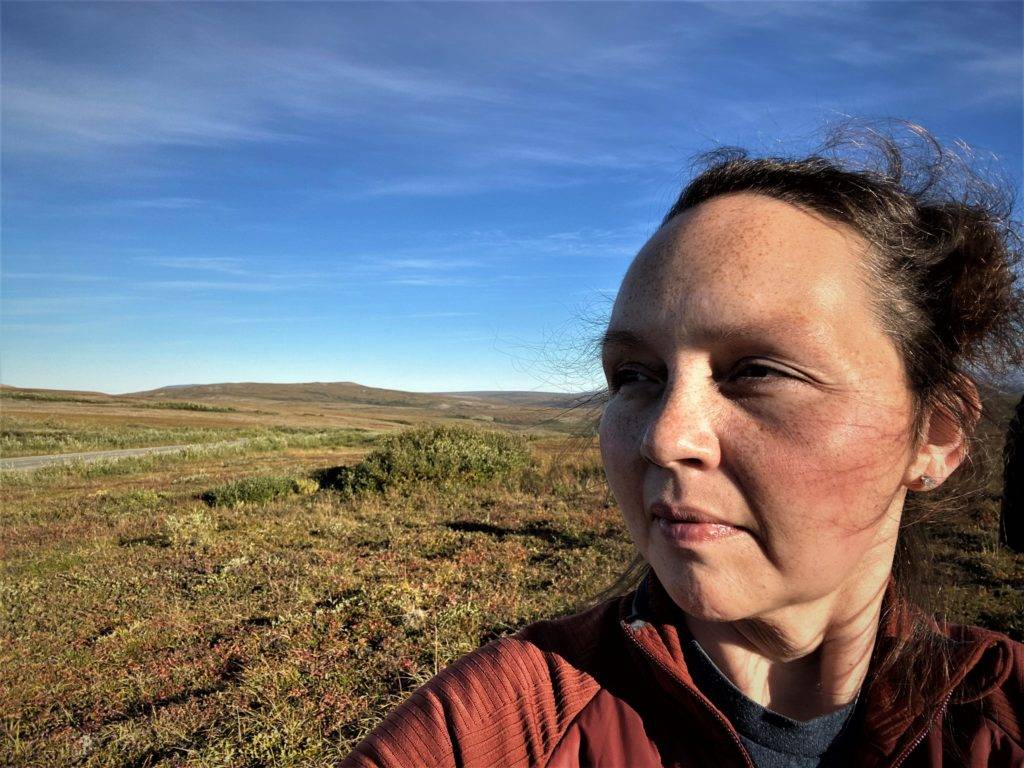01 Mar ANJC Welcomes New Director
Amber Christensen joins the organization as director of operations

Amber Christensen applied to be the new director of operations at the Alaska Native Justice Center (ANJC) because she wants to be part of the change.
“It sounds so silly, putting it that way,” she admitted. “But that’s really it. I have to have meaning in what I’m doing. And then this opportunity came along. I had to take it.”
A Lifetime of Preparation
It’s as if Amber’s whole life has been preparing her to head up an organization that advocates for justice for Alaska Native people. She earned a bachelor’s degree in psychology and sociology, then followed that with a master’s from the Community Clinical Psychology Program; she’s working on a Ph.D. in indigenous studies with a focus on public health and social justice.
She’s motivated to finish that dissertation, in large part, because she sees the need for Alaska Native people to be the decision-makers in areas that affect their own lives—a vision that closely aligns with ANJC’s vision that Alaska Native people be equipped with the tools and knowledge they need to advocate for themselves.
“There are only 136 Alaska Native Ph.D. holders across all disciplines, for all time,” Amber pointed out, citing an audit done Dr. Alberta Jones and Dr. Sean Asikłuk Topkok at UAA in 2013. “If we don’t change that, we continue to not be policy makers. We continue to not be in the boardrooms making decisions to do better for our people.”
Amber first worked as a youth counselor at McLaughlin Youth Center, and then as a juvenile probation officer for high-risk youth. Later, she moved to Colorado and worked as an adult probation officer. Back in Alaska, she left a position as the director of Native Student Services at UAA to join ANJC.
“This feels more like home to me,” she shared.
“Native Enough”
Her education and work history aren’t the only preparation Amber has had for her role at ANJC. As a girl, she grew up listening to her grandmother speak Inupiaq—but only when she was on the phone with her sister. Amber remembers her grandmother never eating her Native foods at home because her children thought they were gross.
Amber’s grandmother looked like her: She was an Alaska Native woman with light skin. Growing up, Amber often struggled with feeling “not Native enough.”
“There was definitely a disconnect,” she recalled. “But I lucked out in a few ways because my uncle was really into Alaska Native stuff. And the other really meaningful thing was all the way through school, I was connected to Indian education. I got to do arts and crafts and Native dancing. Without that, I don’t know that I would have been curious and open to reconnecting with my Native background.”
Although she’s a natural introvert, she added, it’s this experience that compels her to take challenging positions, like the one she’s stepping into at ANJC, and to speak out: “If I don’t talk about the process I went through, that I’m still going through, then how many other Natives that look like me say, ‘I’m not Native enough’? How do I stop that? How do I show that we all look different. That’s why I put my face out there.”

Putting the People First
Although she didn’t always feel connected to her Inupiaq heritage, there was one constant in Amber’s life that tied back to Alaska Native culture: CIRI and its family of nonprofit organizations, including CITC.
She received scholarships for school through The CIRI Foundation and bought her first house with help from the Cook Inlet Housing Authority. When she got divorced, she received assistance with childcare from CITC.
“When I look back at my life, CIRI was always a part of it, whether I knew it or not,” she said.
Established by CIRI in 1993 to address Alaska Native people’s unmet needs within the civil and criminal justice system, ANJC became a subsidiary of CITC in a move meant to more closely align services and provide a stronger continuum of opportunities for the people served by both organizations.
Amber joins ANJC as its new director aiming to collaborate with her new staff.
“I walk in every day asking, How can I help the people here do their job? I’ve got a lot of experience, but I also believe in hiring people who are smarter than you, training them where you need to, and letting them do their jobs,” she described.
Because she has experience with casework and in working with people at the hardest moments in their lives, she brings a firsthand understanding of the importance of ANJC’s work—and the difficulty of the job her staff does.
“The work we do here is hard work. But as long as we put the needs of the client before anything else, we can feel good about the work we do,” she said.
You can learn more about the mission of and services provided by ANJC at anjc.org.


